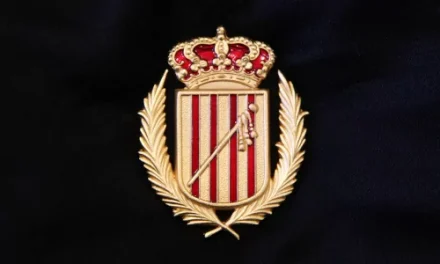
Dr. Joan Francesc Pont
 Joan Francesc Pont, professor of Financial and Tax Law at the University of Barcelona and full academician of the Royal European Academy of Doctors-Barcelona 1914 (RAED), has delivered to the Library of the Academy of the book “Los grados superiores del Rito Escocés Antiguo y Aceptado. Su significado e interpretación” (The higher degrees of the Ancient and Accepted Scottish Rite. Its meaning and interpretation) (Ediciones del Arte Real), which he has written together with Narciso Sáez-Narro, professor emeritus of Evolutionary Psychology and Education at the University of Valencia. The work tries to be a reasoned guide on one of the main and oldest masonic rites, which sets the scale of the 33 degrees accepted by most masonic lodges throughout the world. In fact, the work makes a critical journey through each of these degrees, from its origin to its meaning.
Joan Francesc Pont, professor of Financial and Tax Law at the University of Barcelona and full academician of the Royal European Academy of Doctors-Barcelona 1914 (RAED), has delivered to the Library of the Academy of the book “Los grados superiores del Rito Escocés Antiguo y Aceptado. Su significado e interpretación” (The higher degrees of the Ancient and Accepted Scottish Rite. Its meaning and interpretation) (Ediciones del Arte Real), which he has written together with Narciso Sáez-Narro, professor emeritus of Evolutionary Psychology and Education at the University of Valencia. The work tries to be a reasoned guide on one of the main and oldest masonic rites, which sets the scale of the 33 degrees accepted by most masonic lodges throughout the world. In fact, the work makes a critical journey through each of these degrees, from its origin to its meaning.
 “In this process of hominization that we can see assumed in the Ancient and Accepted Scottish Rite, in its first degrees of Perfection it dramatized how the basic human has gradually been attaining a freedom of thought, with which value is being integrated by history, as reflected in Vedic, Greek and Roman thought: to be free, to know oneself. To reach this goal, the human needs to configure this Active Reason that moves him away from the reactive and that allows him to be free in the full sense of the word. Then we also see why Freemasonry, which defines itself as a progressive society, has been generating or assuming cross-sectional values, if not unhistorical, with universal resonances as any ethic that boasts”, explain the authors in the introduction of the work.
“In this process of hominization that we can see assumed in the Ancient and Accepted Scottish Rite, in its first degrees of Perfection it dramatized how the basic human has gradually been attaining a freedom of thought, with which value is being integrated by history, as reflected in Vedic, Greek and Roman thought: to be free, to know oneself. To reach this goal, the human needs to configure this Active Reason that moves him away from the reactive and that allows him to be free in the full sense of the word. Then we also see why Freemasonry, which defines itself as a progressive society, has been generating or assuming cross-sectional values, if not unhistorical, with universal resonances as any ethic that boasts”, explain the authors in the introduction of the work.
For Pont and Sáez-Narro, “if we carry out a careful reading of the Ancient and Accepted Scottish Rite we can see how the different sections signify and give meaning to evolutions and developments that the human and humanity must integrate in order to pass from an ethical determinism to their relativism and the freedom of conscience. In other words, what is the path to travel to move from the squad to the compass”.



